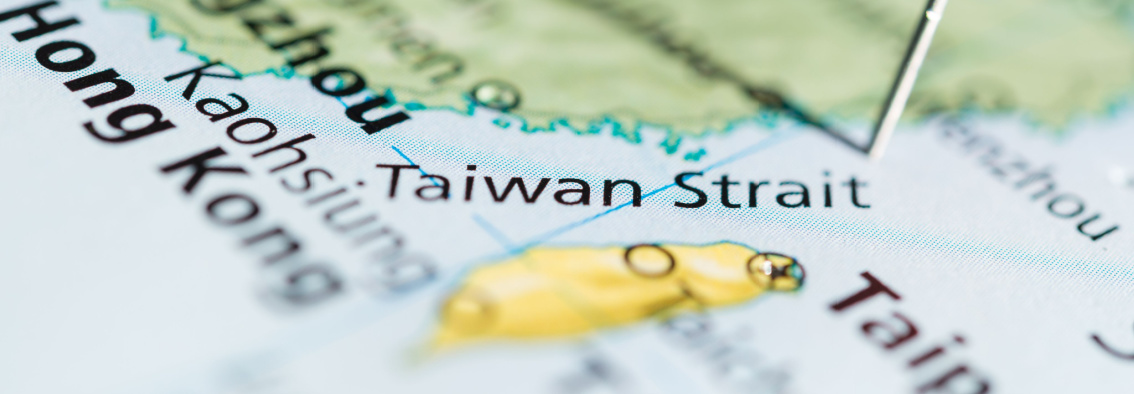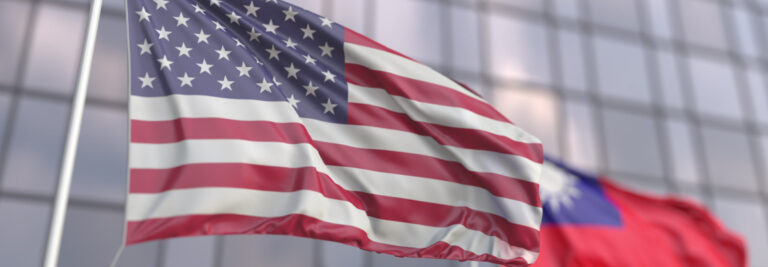Earlier this month, the United States and the People’s Republic of China (PRC) clashed in a “new flashpoint” over a Chinese high-attitude spy balloon that boldly traversed the continental United States for a week before it was shot down by a US F-22 fighter jet off the coast of South Carolina on February 4. [1] In the wake of these events, American intelligence officials confirmed that the balloon was part of a global surveillance campaign designed to collect information on sensitive military sites and radar system capabilities of countries around the world—including Taiwan. Based on these assessments, balloons can better evade detection and collect clearer images than advanced satellites that orbit the earth. This incident suggests that the PRC is not only becoming more belligerent, but also more erratic—and underscores the need for the Biden Administration to be more vigilantly prepared to counter the PRC and its ambitions over Taiwan.
Recent Moves by the Biden Administration in US-China Relations
The balloon incident not only scuttled a planned visit to Beijing by US Secretary of State Antony Blinken—who would have been the highest-ranking American official to visit China since 2018—but also further convinced Washington of Beijing’s duplicity, capriciousness, and ambition to promote its sophisticated espionage missions worldwide. Although countries, especially great powers, do run extensive spy programs targeting each other, aerial surveillance is usually conducted far enough offshore to avoid direct and explicit intrusions into national airspace. To date, Beijing has not offered any credible explanations for its activities—and even pointed fingers at Washington for overreacting and sending its own high-attitude balloons into China’s airspace, a claim the Biden Administration has strongly refuted.
In the midst of this crisis, however, President Biden’s State of the Union Address—given on February 7—sounded incredibly calm and lighthearted on foreign policy, particularly in reference to the PRC’s infringement of American airspace and territorial sovereignty. He repeated the consistent themes of “competing with China” while arguing that “autocracies have grown weaker, not stronger.” At one point during his remarks, Biden even shouted out: “[N]ame me a world leader who would change places with Xi Jinping (習近平), name me one!”
Nonetheless, the president also stressed that he wanted “no conflict,” stating that he was “committed to work with China where it can advance American interests and benefit the world.” Instead of explicitly mentioning the balloon incursion or the US military response, Biden vaguely said, “[Make] no mistake: as we made clear last week, if China’s threatens our sovereignty, we will act to protect our country. And we did.” On a separate occasion, Biden replied to reporters that taking down the PRC spy vehicle would not “weaken” US-Chinese relations. “We’ve made it clear to China what we’re going to do. They understand our position. We’re not going to back off. We did the right thing. And there’s not a question of weakening or strengthening; it’s just the reality.”
Biden’s seemingly soft handling of China’s spy offensive might have been a calibrated approach intended to avoid pushing an opaque and mercurial autocratic regime into a corner, at least until further information could be ascertained about what really led the PRC government to dispatch the spy balloon to the United States. Indeed, reports have documented Xi’s mounting domestic challenges, as well as his alleged unawareness of the decision to launch the balloon. The incident was particularly poorly timed for the Chinese leader, as it undermined his efforts to rehabilitate China’s global image following years of pursuing a “wolf warrior” diplomatic stance abroad, and a highly repressive and draconian zero-COVID strategy at home. Other observers, however, simply argued that Xi was making an adventurous move to test the resolve of Washington, betting he could get away with it without repercussions.
The PRC’s Continuing Hardline Against Taiwan
All these developments again underscore the PRC’s genuine and unrelenting threats towards Taiwan. The self-governing democracy has been subject to persistent PRC harassment and coercive “gray-zone” operations—frequently including spy balloons—utilized by Beijing in preparation for an eventual invasion of the island. Even though US officials have recently discounted the imminence of a major Chinese military attack against Taiwan—at least not by the end of this decade—the recalcitrant responses by the Chinese government in the balloon incident suggested the arrogance of an autocracy that has become blinded by its own concentrated power, propaganda, and self-fulfilling narratives.
Even as the balloon incident was still simmering, the soon-to-be-designated Chinese Communist Party’s (CCP) Central Leading Group for Taiwan Affairs (中央對台工作領導小組) Deputy Leader Wang Huning (王滬寧) received a delegation in Beijing led by Taiwan’s opposition party, the Kuomintang (KMT, 國民黨). The CCP asked the KMT to abide by the “1992 Consensus” (九二共識) supposedly reached between the two parties: a political formulation in which both parties agreed that both Taiwan and China belong to “one China” (although the KMT has argued that “one China” should be the Republic of China, Taiwan’s official name). However, Beijing has never accepted that definition, and has even equated the “1992 Consensus” with the PRC’s “One Country, Two Systems” (一國兩制)—an arrangement that the Taiwanese people overwhelmingly oppose, particularly in the light of China’s harsh crackdown on Hong Kong’s freedom and human rights in recent years.
The Need for Stronger US Support
To be sure, the Biden Administration has not retreated from its support of Taiwan, even though the island democracy was not mentioned in Biden’s State of the Union speech. Taiwan is central to Washington’s efforts to secure cutting edge technology and the integrity of semiconductor supply chains. Building on the CHIPS Act passed last August to promote US-based semiconductor production, free from Chinese interference, President Biden asserted that “We’re going to make sure the supply chain for America begins in America.” Going further, he stated that “I will make no apologies that we are investing to make America strong. Investing in American innovation, in industries that will define the future, and that China’s government is intent on dominating.” Indeed, Taiwan Semiconductor Manufacturing Company (TSMC, 台灣積體電路製造股份有限公司) has come to Arizona and pledged to increase its investment in a large semiconductor plant there. Nevertheless, observers in Taiwan were likely worried to hear Secretary of Commerce Gina Raimondo’s assertion that the United States would need to lessen its dependence on Taiwan’s semiconductor capacity by strengthening its cooperation with other Indo-Pacific allies and partners like India.
The ongoing spy balloon incident underscores the need for the Biden Administration to further bolster Taiwan as Beijing acts more brazenly in challenging the island nation’s security and democracy, as well as the rules-based international order. In order to avoid Beijing’s miscalculations and misperceptions, the United States must more unambiguously reassure Taiwan that it will support it diplomatically, and defend it if necessary. In 2021 and 2022, Biden, on four occasions, reiterated that Washington will defend Taiwan if the PRC engages in military aggression against the island democracy. Over the past several months, however, the president has become more reserved on this issue in the apparent interest of stabilizing ties with Beijing, even in the wake of the spy balloon controversy. In light of this reticence from the White House, US House Speaker Kevin McCarthy’s potential trip to Taiwan may be even more necessary. For the sake of both Taiwan’s future and of peace in the region, the White House should be more unambiguous in condemning China’s behavior and supporting Taiwan.
The main point: While the Biden Administration has been vocal in its support for Taiwan in the past, it has been overly cautious in its approach to China in the wake of the spy balloon controversy. Instead, the White House should be more unambiguous in condemning China’s behavior and supporting Taiwan.
[1] While the US Navy, Coast Guard, and the FBI have yet to recover all of the debris from the downed balloon, three more instances of unidentified aerial objects have been discovered and taken down by US fighters in North America: over Alaska on February 10, Canada on February 11, and Lake Huron on February 12. However, it remains unclear as of this writing whether these latest incursions were also launched by America’s adversaries, or by innocuous actors motivated for corporate or research purposes.




